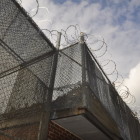
Ruling Could Vacate Sentence of Man Who Carried Out School Shooting Rampage in 1998
|
Citing last year’s Miller v. Alabama Supreme Court ruling, an attorney representing Kipland “Kip” Kinkel -- who in 1998, murdered his parents and embarked upon a shooting spree at Thurston High School in Springfield, Ore. -- has filed a petition asking a state judge to void Kinkel’s current sentence. "He pleaded guilty and didn't try to evade responsibility for what he had done and asked for a lawful sentence," The Oregonian quotes Andy Simrin, attorney for the now 30-year-old Kinkel. Due to last year’s landmark ruling, he is requesting that his client’s current sentence be vacated and a new sentence hearing be ordered. On May 20, 1998 -- a day after killing his parents -- then 15-year-old Kinkel went on a shooting rampage at his high school.









